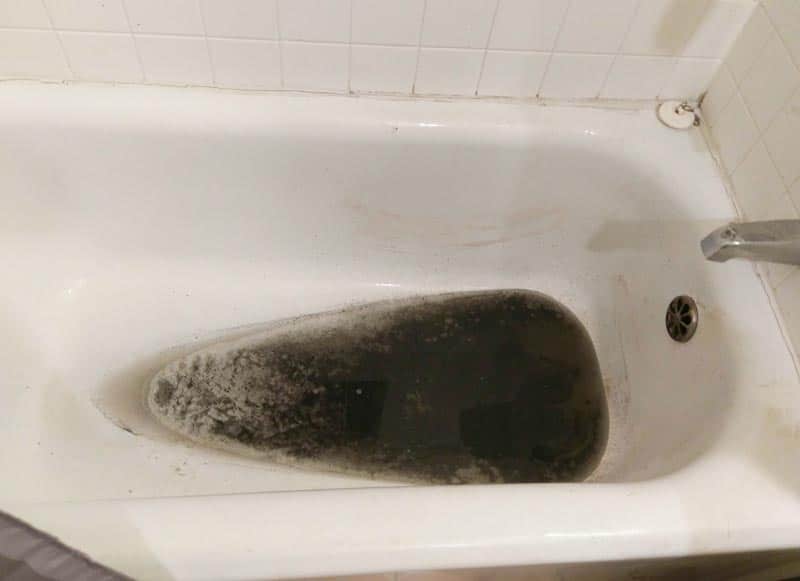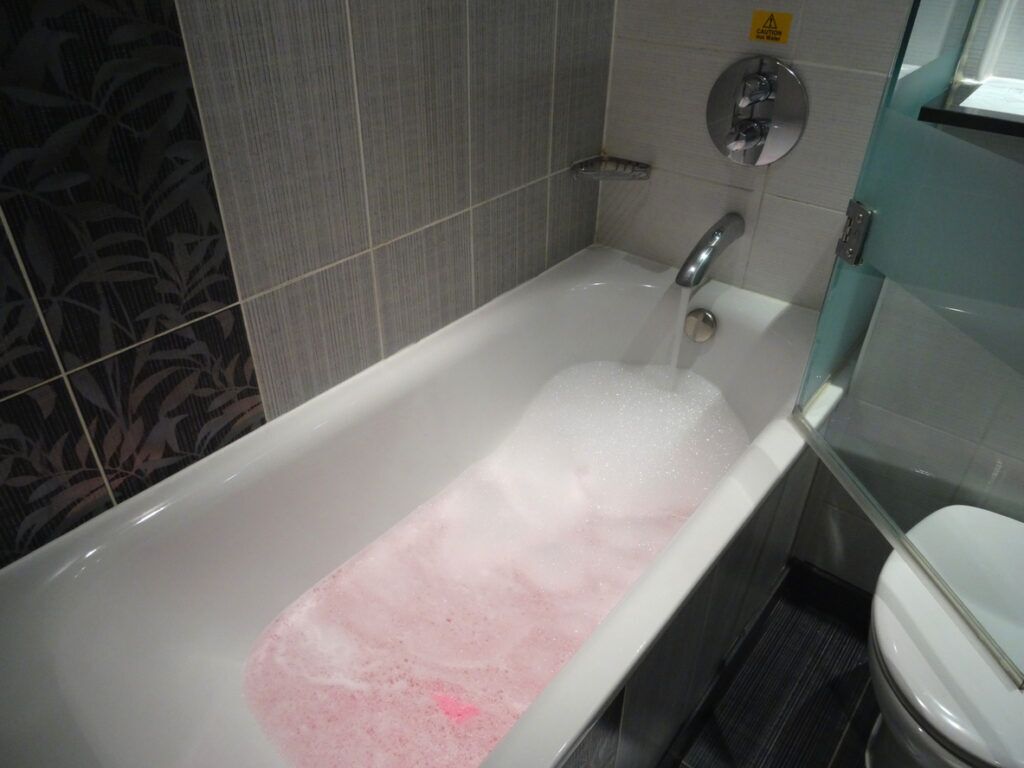Significant Factors Behind Sewage in the Bathtub
Significant Factors Behind Sewage in the Bathtub
Blog Article
The content in the next paragraphs pertaining to Water Coming up Bathtub Drain is especially informative. Give it a go and draw your own conclusions.

Sewer backup in the tub can be a traumatic and unsanitary issue for any home owner. Not just is it bothersome, but it additionally postures severe health and wellness threats and indicates underlying concerns with the plumbing system. Recognizing why sewer is coming up via the bath tub is important for taking proper activity to address the trouble effectively.
Intro to the Problem
Comprehending the Issue
When sewage draws back up right into the bath tub, it's a clear sign of a problem with the water drainage system. The wastewater that ought to be flowing far from your home is instead finding its way back right into your home, which can result in substantial damage and carcinogen.
Prospective Causes
Several aspects can add to sewage backup in the bath tub. From blockages in the sewer line to concerns with the plumbing framework, determining the origin is vital for finding a solution.
Usual Factors for Sewer Back-up
Obstructions in the Sewer Line
Among one of the most typical root causes of sewage back-up is a blockage in the sewage system line. This can occur as a result of the buildup of debris, grease, or international things in the pipelines, stopping appropriate flow and triggering sewer to support into your bath tub.
Tree Origin Breach
Tree origins seeking moisture and nutrients can penetrate sewage system lines through little splits or joints. Gradually, these roots can expand and broaden, creating substantial damages to the pipelines and bring about sewage back-up issues.
Aging Framework
Older homes might have dated plumbing systems that are a lot more vulnerable to rust, splits, and damage. As pipelines age, they come to be more prone to leaks and obstructions, enhancing the probability of sewer back-up events.
Heavy Rainfall or Flooding
During durations of heavy rainfall or flooding, the drain system might become overwhelmed with excess water, causing backups and overflows. This can result in sewage backing up right into bathtubs and other fixtures inside the home.
Health And Wellness Risks Associated with Sewer Backup
Contamination of Supply Of Water
Sewage backup can contaminate the water in your home, positioning a serious health and wellness risk to you and your family members. Direct exposure to contaminated water can cause gastrointestinal issues, skin infections, and various other health problems.
Spread of Illness
Sewer includes hazardous bacteria, infections, and bloodsuckers that can create a series of illness, consisting of liver disease, cholera, and gastroenteritis. Coming into contact with sewage or contaminated surfaces places you in jeopardy of infection.
Mold Growth
Moisture from sewage backup can create ideal conditions for mold and mildew growth in your home. Mold and mildew spores can worsen respiratory issues and create allergies in sensitive individuals, making prompt cleaning necessary.
Indications of Sewage Backup
Foul Odors
Undesirable odors rising from drains or fixtures, especially in the bathroom, might suggest sewage backup concerns. These odors are commonly strong and consistent, indicating a trouble that calls for instant focus.
Slow Draining Fixtures
Tubs, sinks, and toilets that drain gradually or otherwise in any way could be experiencing sewage back-up. If numerous fixtures are affected concurrently, it's likely that the problem stems from an usual factor, such as the primary sewage system line.
Gurgling Noises
Unusual gurgling or bubbling sounds originating from drains when water is running elsewhere in the house are a sign of air entraped in the plumbing system. This air buildup can result from sewage backup and should be examined promptly.
Immediate Actions to Take
Shutting Off Supply Of Water
In case of sewer back-up, it's essential to shut off the water to prevent additional contamination and damages. Locate the main water shutoff valve in your home and shut it off up until the problem can be settled.
Getting In Touch With a Professional Plumber
Dealing with sewer back-up is not a do it yourself job. Call a certified plumber with experience in managing sewage-related problems to analyze the situation and execute required repair services or cleanings.
Avoiding Contact with Polluted Water
Till the sewage back-up is dealt with, prevent contact with polluted water to avoid the spread of germs and pathogens. Use protective equipment if you need to be in the damaged area and wash your hands thoroughly afterward.
Safety nets
Normal Upkeep of Drain Lines
Arrange normal assessments and upkeep of your sewer lines to identify and resolve potential problems before they escalate into major troubles. This can consist of clearing out debris, checking for tree root intrusion, and repairing any type of damaged pipes.
Installing Bayou Valves
Take into consideration installing backwater shutoffs in your plumbing system to prevent sewage from receding right into your home throughout durations of heavy rainfall or flooding. These valves instantly close when water starts backing up, protecting your home from contamination.
Proper Disposal of Household Waste
Prevent flushing anything apart from toilet tissue and human waste down the toilet to stop obstructions and clogs in the sewer line. Dispose of oil, oil, and various other house chemicals properly to lessen the danger of plumbing problems.
Cleaning Up After Sewage Back-up
Sanitation Procedures
Thoroughly sanitize and sanitize influenced areas after sewer backup to get rid of unsafe bacteria and stop mold growth. Use appropriate cleansing products and safety equipment to make certain safe and effective clean-up.
Repair of Impacted Areas
Fix any kind of damage to floor covering, wall surfaces, or fixtures caused by sewage back-up. Depending upon the level of the damages, you may need to replace carpets, drywall, or other products to recover your home to its pre-loss problem.
Why is There Sewage Coming Up Through the Bathtub
Sewage in your bathtub is a major problem that can make you want to abandon the bathroom for good. You don’t have to. However, it is important to identify the source of the issue and take the necessary steps to resolve it in order to avoid any health risks and property damage. In this article, we will discuss what could be causing sewage to back up through your bathtub so you can take action quickly and effectively.
The Main Reason For Sewage Backup in The Bathtub
All the sinks and toilets in your home connect to different pipes that lead to the main sewer line. The sewer line then connects to the municipal sewer system. This connection works seamlessly on a daily basis, but there can sometimes be a problem with the main sewer line.
The most common cause of sewage backup is a clogged or blocked main sewer line. The main sewer line can be clogged due to the accumulation of debris, tree roots or grease buildup, or other materials. Another possible cause is a collapsed pipe. When this happens, your toilets and sinks won’t be able to drain properly. This is when sewage starts backing up through the bathtub. If the problem has been occurring for some time now, it might be time to consult with a plumber as there may be more severe damage that needs fixing.
How Can You Tell if it’s Coming From Your Sewer Line?
If you’re experiencing a sewage backup in your bathtub, then you can use a few simple methods to determine if it is coming from the main sewer line. First, try to unclog the tub drain with a plunger or an auger and see if that helps. If not, then inspect all of the drains in your house and check if there is any blockage in them. If some of the other drains are not working fine, then it’s likely the problem is with your main sewer line.
Common Signs of a Clogged Main Sewer Line
If you suspect that your main sewer line is blocked, then there are a few common signs to look out for. Frequent clogs in your home are a sure sign of a clogged sewer line. You can also check for slow drainage from all the plumbing fixtures.
Slow Drains
If you notice that it takes longer for your sinks and toilets to drain, then this could be a sign of a clogged main sewer line.
Frequent Clogs
Another common sign is that your drains or toilets become clogged almost all of the time. If this happens, then it could be a sign that the main sewer line is blocked.
Water Backup
Do you notice water or sewage coming back up from any of the drains in your home? If your answer is yes, you may have a clogged main sewer line.
Sinkholes
If you’ve noticed sinkholes in your yard or overflowing sewage from the ground, you may be facing a blocked sewer line issue.
Your Shower or Sink Makes Gurgling Noises
Have you noticed gurgling noises coming from your sink or shower lately? These are typically signs of a blocked sewer line and should be checked out immediately.
How to Prevent a Main Sewer Line Clog
Once you’ve identified that your main sewer line is clogged, it’s important to take steps to prevent it from happening again. The best way to do this is to avoid putting any solid material that can clog the drain, such as grease and other debris. You should also be mindful of what you flush down your toilet. In addition, you should schedule regular maintenance for your main sewer line. This will help keep it clear and free from clogs or backups.
What Should You do if You Notice Sewage Backing up Through The Bathtub?
If you’ve noticed sewage backing up through the bathtub, then it is important to call a professional plumber immediately. A plumber can inspect the situation and determine what the cause is, such as a blocked main sewer line. They will also be able to advise you on how best to fix the issue. In some cases, a simple drain cleaning may be all that is needed.
However, if the blockage is severe, then your plumber may need to use more advanced methods to clear the blockage.
No matter what, it is important to always call a professional plumber if you experience any kind of sewage backup. They will be able to assess the situation and provide you with a solution that is best for your home.
https://baylorinc.com/blog/why-is-there-sewage-coming-up-through-the-bathtub/

Do you appreciate more info about Why is There Sewage Coming Up Through the Bathtub? Create a remark further down. We'd be pleased to see your views about this write up. We hope that you come back again in the future. Are you aware of somebody else who is interested in ? Take a moment to share it. I truly appreciate your readership.
Request Estimate
Report this page